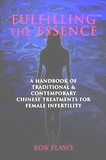Acupuncture & TCM Articles
Acupuncture - Assisting Infertility Through Better Ovarian Function
Author: Brian Winkels
In the past, acupuncture has stirred images of zither music (i.e. a stringed instrument having 30 to 40 strings over a shallow horizontal soundboard and played with pick and fingers), darkened rooms and incense burning. Toss in the added visual of needles sticking in the flesh and surely, no one in their right mind would consider venturing into this alien world seeking Oriental magic to improve their health and general well being.
Of course, the answer is yes. People have sought and will continue to seek traditional Chinese treatments and have been rewarded with better health. On the other hand, going into this new world of treatment many may are worried about the pain they may have to experience in order to attain a higher level of health but rest assured being stuck with acupuncture needles produces only a momentary twinge that soon disappears. However, a common side effect is an occasional light bruise that may remain on the treated area for short time.
In a nutshell, the basic principal behind acupuncture is one of energy flow. Channels of energy, known as meridians, flow through and over the surface of the body and whenever any impedance to this free flow of energy occurs it results in pain, illness and disease. Some areas of the body end up with too much energy while others no longer have enough.
The placing of needles on various "points" assists in opening up the blocked areas and according to modern scientific theory, the needles stimulate the nervous system into releasing chemicals into the muscles, brain and spinal cord which help the body to heal itself.
Better Suited for Individuals with Functional Disorders
Acupuncture and infertility are akin to hand and glove when it comes to couples having functional rather than structural infertility issues. A good example of a structural infertility problem would be a woman with a damaged fallopian tube. On the other hand, couples having functional infertility would have a much higher rate of success by supplementing their standard medical treatment with acupuncture. As time passes, there has been a growing acceptance of acupuncture and infertility where acupuncture has been found to help in treating infertility.
In fact, acupuncture is increasingly being seen as a viable alternative in treating infertility problems; as a viable and complementary therapy in treating infertility. Acupuncture can also be used as a stand-alone infertility treatment in couples who experience a functional problem such as irregular ovulation. It has also been useful for some couples experiencing structural problems like a blocked sperm duct. Some treatments may also be augmented with Chinese herbs aimed at infertility.
The debate has been ongoing as to why acupuncture works for many couples in treating infertility and will probably continue for some time. However, the bottom line is that it has been shown to help regulate the body's system by improving blood flow to the reproductive organs and by helping to stabilize hormone levels. As a result, acupuncture has helped infertility in both men and women because by increasing ovarian function in females and the production of sperm in males.
 Fulfilling the Essence: Fulfilling the Essence:
Traditional & Contemporary Chinese Treatments for Female Infertility
By Bob Flaws
DESCRIPTION: This book is another in Bob Flaws' series on gynecology. It is the most complete discussion of Chinese medicine on this subject available in English. It includes the TCM treatment for various Western diseases associated with infertility, including female immunologic infertility, fallopian tube blockage, endocrine imbalances, polycystic ovarian syndrome, uterine myoma, luteal phase defect, anovulation, and endometriosis.
Eighty percent of couples having regular sex without contraception will conceive within one year with another 10% conceiving after that. This suggests that around 10% of the population suffers from infertility. Of this number, 40% is due to female problems, 40% to male problems, and 10% to a combination of both acting synergistically. Peak fertility seems to occur between 21-25 years of age in both males and females after which it gradually declines. After 25 years of age, there is a 75% chance of pregnancy within 6 months. Approaching 30, this decreases to only a 47% chance. Approaching 40, this further decreases to only a 25% chance, and after 40 to a 22% chance. Another way of stating these statistics is that a woman's risk of infertility is 2 times greater in women between 35 and 44 than in women between 30 and 34. It also seems that the risk of infertility is 1½ times higher for African Americans than for whites.
| 